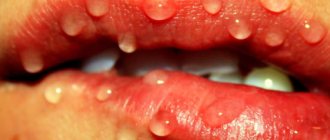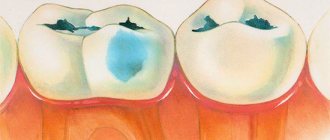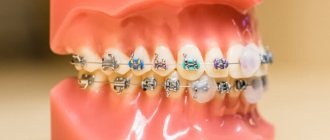Detection of ammonia odor from the mouth of a person at any age can signal certain organ diseases, nutritional disorders, poor oral hygiene, and other phenomena.
In some cases, you can get rid of it on your own, but if the cause lies in serious illnesses, you should immediately consult a doctor. The smell of urine in the mouth appears from saliva with an ammonia admixture secreted from urea. There may still be a metallic taste in the mouth.
Causes of urine odor from the mouth
The appearance of unpleasant aromas in the mouth of a person of any age and gender always causes discomfort and a feeling of alertness.
Experts attribute certain health conditions to the causes of ammonia odor from the mouth.:
- kidney diseases (pyeloniphritis, stones and other organ pathologies), infectious and viral diseases, diabetes mellitus;
- restrictions on food intake, diets, monotonous meals;
- taking certain medications;
- diseases of the gastrointestinal tract, in particular gastritis, pancreas, pathology of the bile ducts, gastritis and others.
The smell of urine may be accompanied by a coating on the tongue and an unpleasant aftertaste. If a person rarely eats or consumes an insufficient amount of fluid for the daily norm, these phenomena affect the negative functioning of the kidneys.
In this case, a balanced diet with fluid intake will help you correct the situation yourself. With a protein diet, heavy loads fall on the liver and kidneys, which does not allow ammonia to be naturally and timely removed from the body. With the rapid breakdown of fats, the formation of ketone bodies increases, which contribute to this phenomenon.
If you are following a low-carbohydrate diet, it is quite possible that an unpleasant odor will soon appear . In this case, the necessary consumption of water will help get rid of the problem. A common cause of urine bad breath is kidney failure, or kidney disease. Thanks to this organ, decay products are naturally removed from the body, and if abnormalities are noted in the kidneys, the signal will be the appearance of an ammonia stench.
The main renal diseases include dystrophy, pathologies, renal failure, pyeloniphritis, stone formation . Additionally, symptoms such as a decrease and increase in blood pressure, swelling, and pain in the lumbar region may appear.
In addition to kidney diseases, taking certain medications, as well as a vitamin and mineral complex, can provoke the appearance of a similar aroma in the mouth. This is mainly observed when taking medications that contain amino acids and nitrogen. Ammonia breathing in patients with diabetes may signal the development of coma. During this period, there is a large amount of glucose, which is excreted through the urea.
In addition to the fact that the breath smells like urine, a person feels unwell, mental and physical activity decreases, and there is a constant serious condition throughout the body. This phenomenon is especially pronounced during serious development and exacerbation of the disease. With impaired metabolism, the final product is excreted through the lungs. If it is impossible to eliminate bad breath with normal hygiene procedures, contact a specialist.
Why appearances
Keep in mind! Ammonia is produced in the body during the breakdown of proteins and fats.
In a healthy person, this natural process ends very quickly; toxic breakdown products are easily eliminated from the body.
The smell of ammonia from the mouth indicates problems in the functioning of individual organs that cannot cope with toxins.
If ammonia cannot leave the body through the genitourinary system, it exits through the lungs. This is why the smell of ammonia comes from your mouth.
At best, the cause of an unpleasant odor may be improper oral care ; at worst, it may be the appearance of pathology .
In most cases, bad breath occurs as a result of diseases of the teeth and gums. Much less often, the cause lies in the pathology of the internal organs.
Main reasons
For your information! There are several known reasons for the appearance of ammonia odor from the mouth:
- Poor nutrition. Violation of the diet is one of the reasons for the appearance of uncharacteristic odors from the mouth. With a lack of nutrients in the body, the process of active breakdown of stored fats begins to replenish energy. Excess protein in the menu disrupts the functioning of the kidneys and liver due to overload. Improper functioning of these organs makes it difficult to remove ammonia from the body naturally. Excessive consumption of foods enriched with proteins causes rapid breakdown of fats, which means increased formation of ketone bodies. The body, not accustomed to such a load, cannot remove ketones in a timely manner; they accumulate in the body, causing an unpleasant odor.
- Restrictions on drinking and eating. For normal functioning of the kidneys, a large amount of water is required, if it is not enough, it means that it is difficult to remove waste products through the kidneys. This leads to stale breath from the mouth. Hunger forces the body to process stored fats and proteins to replenish missing nutrients, resulting in a significant increase in the level of ketone bodies in the blood.
- Liver diseases. Ammonia is filtered through the liver and eliminated from the body by the urinary system. When liver function is impaired, the filtration of ammonia compounds slows down, which provokes the accumulation of ketones in the blood plasma.
- Taking medications that contain amino acids and nitrogen. Such drugs include:
- ACTI-5 is prescribed to children with growth retardation and poor appetite.
- Biotredin is used to improve performance.
- Glycine is prescribed for frequent stress, vegetative-vascular dystonia, lack of sleep, and alcoholism.
- Methionine is used in the treatment of kidneys and diabetes.
- Moriamin Forte is prescribed during pregnancy and lactation.
- Diabetes. The main characteristic of this disease is high blood glucose levels. Tissues cannot cope with the absorption of glucose, so the required amount of useful elements does not reach the cells. To replenish the required amount of vitamins and minerals, fats begin to break down at an accelerated pace, thereby forming much more ketone bodies. Ketones, when accumulated in the blood, have a toxic effect on the body, which leads to the appearance of an ammonia odor from urine, skin and breath.
- Kidney diseases such as nephrosis, renal dystrophy, renal failure. This leads to serious disruptions in the functioning of the renal tubules, due to which normal metabolism occurs. Pathological changes lead to the accumulation of ketone bodies.
- Thyrotoxicosis is a disease of the endocrine system, namely the thyroid gland, in which the level of thyroid hormone increases. This hormone is responsible for metabolism, its increase leads to an acceleration of metabolism. An accelerated metabolism affects weight loss.
Treatment process
If you notice a taste of ammonia in your mouth, the cause of which is unknown, you should contact a specialist . It is natural for a person to eliminate the problem using independent methods. If your food intake is limited, for example, switching to a balanced, healthy diet would be an effective method. In cases where the manifestation of ammonia aroma occurs periodically, you can chew coffee beans, and also clean the tongue area when brushing your teeth.
When the problem is related to diseases, it is necessary to contact such specialists as a dentist, therapist, urologist, as well as an endocrinologist and gastroenterologist.
It is also necessary to take a general blood test, urine test, perform an ultrasound of the organs, and undergo additional examination to make the correct diagnosis. After these procedures, the doctor prescribes competent treatment when the disease is detected.
The most common medications for treatment include:
- stopangin , which has antifungal and antibacterial effects. It is used twice a day for rinsing before meals. The drug is contraindicated in pregnant women, children under six years of age, as well as in cases of atrophic pharyngitis;
- chlorhexidine with antiseptic and bactericidal properties, eliminating Candida fungi and harmful bacteria. It is mainly used to treat cystitis and is used in bladder lavage. The drug is contraindicated for dermatitis, allergic reactions, itching;
- Hexoral is prescribed for dental problems. The main component hexethidine has a suppressive oxidative reaction to bacteria. It is used twice a day. This drug is not prescribed for children under three years of age and those with allergic reactions.
Getting rid of odor at home
If you notice a smell or taste of ammonia in your mouth, you should not try to discover the cause on your own; it is important to consult a doctor in time. You can devote a couple of days to correcting your diet and oral hygiene. If a person has been following a strict diet, he needs to stop, make his diet complete, eat a variety of foods, often, little by little.
Be sure to normalize your drinking regimen - drink as much as you should according to your age and weight, unless there are contraindications. The effects of food consumption can be masked by chewing coffee beans and brushing your tongue.
If after a couple of days, despite the measures taken, the smell remains, you need to make an appointment with one of the following specialists: dentist, urologist, therapist, gastroenterologist, endocrinologist. The children are taken to the pediatrician.
He will determine which tests to take and which specialist to consult. Diagnostic measures include CBC, OAM, ultrasound examination of the peritoneal organs, and other instrumental and laboratory tests.
Based on the results obtained, the doctor will prescribe treatment. Usually prescribed for unpleasant odor:
- Stopangin. This is an antibacterial, antifungal agent. Used before meals in the morning and in the evening as a mouth rinse. Should not be taken by pregnant women, children under 6 years of age, or patients with atrophic pharyngitis;
- Chlorhexidine. It has bactericidal, antiseptic properties, fights pathogenic bacteria and fungi of the Candida family. Prescribed for the treatment of cystitis - the solution is used to rinse the bladder cavity. You should not use the product if you have allergies, dermatitis, or itching;
- Hexoral. Helps with dental problems. Contains hexetidine, which reduces the oxidative reaction to bacteria. Apply in the morning and evening. Should not be taken by pregnant women, children under 3 years of age, or people with allergies.
The listed medications are prescribed by a doctor; self-medication is fraught with complications, reverse effects, and adverse reactions.
It is impossible to completely eliminate bad breath using only a home first aid kit, since the causes may not be temporary.
However, if you smell the odor occasionally, you can try to mask it, and also adhere to hygiene procedures more often than usual (brushing your teeth, fresheners, etc.).
Using some medicines from the medicine cabinet that have antibacterial properties can also help for a short time: Chlorhexidine, Stopangin, etc.
We use traditional methods
The benefits of traditional methods of treatment
If the smell of ammonia from the mouth is not associated with organ disease, it can be eliminated using traditional medicine remedies and recipes. For rinsing in order to eliminate the fetid aroma, you can make decoctions or tinctures from medicinal plants at home:
- dilute 30 drops of St. John's wort tincture in a glass of warm water, rinse your mouth after meals at least 2 times a day;
- strawberry tincture. Boil dry strawberry leaves (one tablespoon) in two glasses of water. The tincture is drunk orally several times a day;
- To suppress salivary secretions, decoctions and infusions from plants and herbs such as tansy, yarrow, and wormwood help to cope with pathogenic microflora. To do this, you will need to take one tablespoon of any of the listed herbs, or mix them, steam them in one glass of boiled water, leave for at least fifteen minutes, strain and rinse your mouth three times a day;
- Calamus tincture has an excellent refreshing effect, the preparation of which requires 1 tablespoon of dried herbs and a glass of boiling water. The tincture is steamed for 40 minutes, after which rinsing should be done five times a day.
- Oxalis tincture is prepared from 3 tablespoons of dried herbs and half a liter of boiled water. The product must be infused for at least two hours, expressed through gauze and rinsed.
Treatment with folk remedies involves the consumption of foods that stimulate salivation, in particular green tea, natural yogurt, apples, and other fruits.
During treatment, avoid the consumption of fermented milk products, cheese, and foods that contain protein. They leave behind an unpleasant plaque that promotes the spread of harmful microorganisms in the oral cavity and creates an unpleasant odor. It is also necessary to give up bad habits, alcohol, and smoking.
What to do to treat and eliminate the symptom based on the reasons stated above?
Treatment is prescribed by the doctor based on the reasons that caused the symptom.
When diabetes , a specific diet is prescribed, blood glucose levels are monitored, and insulin is prescribed.
Keep in mind! In addition, the patient should engage in physical therapy and increase physical activity.
If kidney diseases , which are divided into infectious and non-infectious, the doctor prescribes antibiotics, hormonal and diuretic drugs .
Additionally, physiotherapy, herbal medicine and vitamins and minerals are prescribed.
In the treatment of thyrotoxicosis the following is used:
- Drug treatment , which consists of taking drugs that reduce the activity of the thyroid gland.
- Radioactive iodine , which, when accumulated in the body, destroys the functioning of the thyroid gland.
- Surgical intervention if the above methods do not help in treatment. The operation consists of removing the focus of thyrotoxicosis localized in the thyroid gland.
Treatment must be carried out with a mandatory diet , which is compiled individually for each patient.
Important! Be sure to control the amount of liquid you drink. This is necessary for proper kidney function.
You should drink at least 2 liters of water per day.
If the diagnosis does not reveal any abnormalities in the human body, then you can get rid of the unpleasant odor with the help of antiseptic drugs : Chlorhexidine, Hexoral, Stopangin.
They help suppress the oxidative reaction of the metabolism of pathogenic bacteria.
You should rinse your mouth with the medications 2 times a day.
Folk remedies
You should know! Using folk remedies will help get rid of the ammonia taste in the mouth:
- St. John's wort tincture. She needs to rinse her mouth after any meal. To prepare, you will need 30 drops of alcohol tincture, which are diluted with 1 glass of water.
- Strawberry tincture. She needs to rinse her mouth after any meal. To prepare, you will need 1 tablespoon of dried strawberry leaves, which are brewed in 2 cups of boiling water.
- Olive oil. You need to take 1 teaspoon of olive oil and rinse your mouth with it.
- Coffee beans. To eliminate the unpleasant odor, just chew a few coffee beans.
- Tincture of oak bark. She needs to rinse her mouth after any meal. To prepare, you will need 1 teaspoon of bark, which is poured with 200 ml of boiling water.
- Beeswax. You need to melt the beeswax in a water bath, add honey, lemon juice, and a few drops of mint or tea tree essential oil. Cool the mixture and roll it into balls. This gum can be chewed several times a day.
From this video you will learn which disease symptoms bad breath can cause:
Bad breath causes discomfort when communicating with other people , which leads at a minimum to poor health, mood, and at most to neurosis and loss of social connections.
In order to avoid the problem of ammonia taste in the mouth, you need to eat a balanced diet, lead a healthy lifestyle, sleep more and do exercises every morning.
If the symptom is already bothering you, you should consult a doctor. Timely medical care will help preserve health and prevent serious consequences.
An ammonia smell in the mouth, regardless of a person’s age, indicates the presence of diseases, errors in nutrition, insufficient oral care, and other phenomena. It is only theoretically possible to figure out on your own what exactly caused it.
Assume whether the problem is related to physiology or pathology, and whether to panic. Sometimes you can get rid of the problem at home, but if the cause is a serious pathology, you need to be treated under the supervision of a doctor. The uremic odor is accompanied by an unpleasant taste, often a metallic taste.
Ammonia odor in a child
Parents are concerned about the appearance of an unpleasant aroma in the baby’s mouth, similar to urine. Experts attribute the development of liver diseases to the reasons for this phenomenon, in particular chronic liver failure, cirrhosis, forms of hepatitis, diseases of the ENT organs and lungs.
Problems may be related to the kidneys or the presence of diabetes. As the disease progresses, the child may experience weakness and nausea. It is quite possible that there is no problem, but the child himself seems to have an ammonia smell in his mouth. In such a situation, you should consult a dentist and examine your oral cavity. The smell of ammonia from the mouth of a child can appear periodically, just like an adult. Usually in the morning, or after eating.
In conclusion, it should be noted that breathing with a urinary aroma in both an adult and a child can signal serious illnesses. Before fixing the problem, immediately contact a specialist for a diagnosis and follow their recommendations.
vashyzuby.ru
What should urine smell like normally?
What does a child's urine smell like normally? In newborns who were born a few weeks ago, the urine is almost colorless and has no aroma. It looks more like clear water.
A slight odor is normal. Urine is a waste product; substances formed as a result of metabolism are excreted along with it. Like any bodily fluid, it smells. A pungent and strong odor should alert you - it may indicate disturbances in the functioning of the body.
Causes of bad breath
The cause of bad breath can be rotting (decomposition) of food debris and mucus accumulated between the teeth and on the tongue, as well as various psychological problems.
In 80% of cases, the oral cavity is the source of bad breath. The most unpleasant smell usually comes from the grooves in the tongue. After all, it is on the back of the tongue that many dead, exfoliated bacteria and epithelial cells accumulate. About a hundred bacteria adhere to one epithelial cell of the tongue. Bacteria absorb sulfur-containing components of plaque and food. Under their influence, the amino acid molecules cysteine and methionine break down into methyl mercaptan and hydrogen sulfide. Both of these compounds have a foul odor.
The cause of bad breath can also be dysbiosis of the oral cavity, stagnation of saliva, dry mouth, an imbalance of the acid-base balance of the oral cavity with a high protein content in the diet, an increased number of necrotic or dead cells, and dry mouth.
Saliva cleanses the mouth and teeth, destroys pathogens. Dry mouth is the most common cause of bad breath. Dry mouth occurs when salivation decreases (with stress, anxiety, infectious diseases, diabetes), and when the body is dehydrated.
The cause of bad breath may be an exacerbation of a disease that has become chronic. A sour taste and smell can cause diseases of the esophagus, gastritis with high acidity. In case of stomach diseases, unpleasant odor from the mouth may be associated with Helicobacter pylori infection. A bitter taste and unpleasant odor are a manifestation of liver and gall bladder diseases. The smell of feces from the oral cavity can occur with motor neuroses or intestinal obstruction, with dysbacteriosis. The acetone odor with a sweetish taste can cause pancreatic diseases. The smell of urine from the mouth indicates kidney disease. Inflammatory periodontal and gum diseases are another common cause of bad breath.
Bad breath can also be associated with malignant neoplasms in the oral cavity and inflammatory processes in the nasopharynx. Oral cancer causes bleeding, destruction and death of tissue.
Factors affecting urine odor
Parents often wonder why their child’s urine begins to smell foreign. The following factors can provoke this:
- Changing the baby's diet. With age, the infant is introduced to new foods, such as vegetables and fruits, which have their own specific flavors. They can greatly affect the smell of urine, making it more pronounced, sometimes even pungent.
- Dehydration of the body. It is very important for your baby to drink enough liquid. Exhaustion of the body can occur as a result of acute poisoning with food or poisons. As a result of intoxication, the body releases a large amount of liquid that does not always smell pleasant.
- Lack of vitamin D. Usually, the body lacks this useful element if the child spends little time outside. Sometimes this leads to the development of rickets. One of the symptoms of this disease is the pungent odor of the fluid that is excreted by the genitourinary organs. Also, a lack of vitamin D leads to decreased appetite, increased sweating and poor hair growth.
- Taking strong medications and antibiotics. Antiviral drugs are partially or completely eliminated through the genitourinary system, giving the urine a specific odor. After the course of drug treatment is completed, all indicators return to normal.
- Breast-feeding. In this case, the smell of urine may be due to a change in the mother's diet. White cabbage and asparagus can significantly change the smell of urine.
- Colds. With rhinitis, ARVI and bronchitis, urine always begins to emit an unpleasant odor. The body becomes exhausted as a result of fighting the infection. After complete recovery, the smell of urine disappears completely.
- Hepatitis. A sign of this serious disease is an unpleasant odor and dark color of urine.
- Diabetes. Patients with this disease usually have colorless urine. The frequency of going to the toilet increases. Urine has an ammonia or vinegar odor.
- Pyelonephritis or cystitis. With such diseases, sometimes the urine suddenly changes its smell.
Mothers often wonder why their baby's urine smells. Many doctors can guess by smell what disease a small patient is suffering from. For example, if an ammonia smell is noticed, then most likely this is a clear sign of a problem with the urinary tract.
This disease occurs as a result of improper functioning of the endocrine glands. A large number of ketone bodies are formed in the blood, and then in the urine. Most likely, the patient suffers from diabetes or acetonemia.
Characteristic symptoms of the disease are: child complaints of thirst, pain when urinating, dry skin and sudden weight loss. If the above signs are absent, but the child’s urine is dark in color when urinating, this means that a focus of infection has appeared in the urinary system.
To get rid of the disease, you will need to undergo a course of antibiotic treatment.
Treatment of bad breath
To treat bad breath, it is very important to follow these recommendations:
- Brush your teeth with a soft-bristled toothbrush three times a day to remove food particles remaining in the mouth and stuck in the teeth;
- clean the interdental spaces with dental floss;
- clean the back of the tongue daily with a soft-bristled brush;
- to stimulate salivation, regularly eat fresh fruits and vegetables and adhere to a diet;
- to eliminate xerostomia (dry mouth), rinse your mouth with warm water;
- visit the dentist regularly.
To clean the mouth at home, you can prepare decoctions of sage, mint, strawberries, chamomile or oak bark. To do this, pour a tablespoon of any raw material into a glass of hot water. After cooling, strain the solution and use it as a rinse after meals. An irrigator provides fairly effective cleaning of the oral cavity. The irrigator massages the surface of the gums, activating blood circulation and cleaning the spaces between the teeth.
How to quickly remove bad breath?
There are a huge number of effective means that help quickly get rid of unpleasant odor from the mouth: aerosol fresheners, rinses, lollipops, chewing gum. But if you don’t have anything at hand at the right time, you can try drinking a cup of very strong tea and then rinsing your mouth with water. Carrots and apples will help quickly remove bad breath. The aroma of garlic or onion can be neutralized with celery or parsley root. You can very quickly get rid of the unpleasant taste and odor from your mouth by chewing coffee beans. To activate saliva production, you should include rolled oats porridge in your diet. If you have dry mouth, you should drink as often as possible. A small amount of liquid will freshen your breath and remove the unpleasant aftertaste.
If it is not possible to brush your teeth with a toothbrush, you can wipe your gums, tongue and teeth with your finger. This way you can massage your gums and get rid of unpleasant odor. You can use walnut pulp to wipe your gums. Rubbing the gums with walnut pulp provides the oral cavity with essential vitamins and freshens breath with a pleasant nutty taste.
Video from YouTube on the topic of the article:
www.neboleem.net
The stench is not without reason
The main reason for the spread of foul odors is diseases of the oral cavity, provided that bad habits and characteristics of the food consumed are not taken into account. Provoking diseases include caries, periodontal disease, gingivitis, cysts and periodontitis. For example, with gangrenous pulpitis the smell is quite specific, but we will discuss this further.
ENT diseases are also the cause of bad breath, especially if the disease is accompanied by purulent discharge.
The source of diseases is the inflammatory process. Problems with the nasopharynx occur with sinusitis, tonsillitis, pharyngitis, sinusitis and sore throat. When nasal breathing is difficult, a person breathes through the mouth, which causes dryness of the mucous membrane. Drying is the third cause of unpleasant odor.
Waking up one day, a person realizes that his breath is far from fresh. Why is this happening? When people sleep saliva
is produced poorly, and the oral cavity dries out. The same situation occurs during a long conversation. Sometimes dryness becomes chronic, then we are talking about a disease called xerostomia. Saliva helps flush out harmful bacteria from the body and mouth, and reducing saliva leads to the proliferation of germs that cause stink.
Diseases of the internal organs can cause a foul odor from the mouth (gastritis, cirrhosis, constipation). It is better to visit the appropriate doctor after consulting a dentist, who will rule out diseases of the teeth and gums.
Dentures contribute to bad breath. The reason for this is improper care of the prosthesis or lack thereof, as a result of which bacteria multiply on its surface.
What can come out of your mouth - from rot to hydrogen sulfide
The stench can be caused by food debris and bacteria growing in the mouth. You can determine a particular disease of the body by the type of smell:
- When hydrogen sulfide smells rotten, reminiscent of spoiled eggs, the process of protein decomposition occurs in the body. If a person suffers from pain in the stomach, intestines, nausea and belching after eating, which is often accompanied by an unpleasant stench from the mouth, then most likely the cause is gastrointestinal diseases.
- A sour smell is evidence of gastritis with high acidity. This includes diseases of the esophagus, intestines, and ulcers.
- bitter stench in the mouth indicates diseases of the gallbladder or liver.
- A person suffering from dysbiosis, dyskinesia and poor intestinal permeability also suffers from the smell of feces .
- A sweetish stench, reminiscent of the smell of acetone , appears due to diabetes mellitus and diseases of the pancreas.
- If you have kidney disease, your breath smells like urine .
Symptoms that may accompany this sensation
Note! The taste of ammonia in the mouth may appear periodically, then the cause should be sought in poor diet.
Persistent bad breath indicates a more serious condition and requires immediate medical attention.
In addition to bad breath, a person may have other symptoms , such as:
- Constant thirst and dry mouth, frequent urge to go to the toilet, lack of concentration and attention, and muscle weakness indicate diabetes.
- Rare urination with dark-colored urine, lower back pain, surges in blood pressure and swelling indicate kidney disease.
- Rapid weight loss, excessive sweating, irritability and anxiety , as well as menstrual irregularities in women can indicate hormonal disorders and a malfunction of the endocrine system.
Independent struggle
It is possible to independently combat bad breath at home, although it is quite difficult to achieve the desired result quickly and for a long time.
First, it is necessary to establish the cause of halitosis, be it problems with teeth, gastrointestinal tract, kidneys, liver or others.
The following methods will help get rid of bad breath and eliminate the unpleasant odor emanating from the gums and teeth:
- to urgently remove amber from the mouth, it is enough to chew coffee beans;
- drugs such as Chlorhexidine and Triclosan - antiseptics that last up to 12 hours - can fight bacteria in the oral cavity;
- Oral hygiene products with carbamide peroxide and triclosan cope with stench;
- it is advisable to rinse the gums and all mucous membranes with a solution of hydrogen peroxide or soda;
- When brushing your teeth, you also need to treat your tongue; you can buy a spiked brush pad;
- preparations based on medicinal herbs have a positive effect: you can rinse the mucous membranes with infusions of herbs such as alfalfa, propolis and chamomile;
- essential oil of sage or tea tree reduces the intensity of the stench for several hours;
- Mint or menthol chewing gums freshen your breath, but it is advisable to chew them for up to 10 minutes.
You should also pay attention to your brush; maybe it simply cannot cope with plaque and should simply be replaced.
How to get rid of bad odor with the help of professionals?
Visiting the dentist is a simple and effective solution to oral problems. Of course, this is not a cheap pleasure, but it is effective. If halitosis has been plaguing a person for a long time and no methods help to cope with this problem, then in this case the help of a qualified dentist is necessary.
Bad breath is often caused by gum disease. It is advisable to consult a periodontist who specializes in the treatment of periodontal diseases.
The specialist carries out preliminary cleaning of dental plaque, which provokes the development of the inflammatory process. Severe soft tissue damage requires surgery. The gum pockets are cleaned of tartar.
Often, the breath smells rotten due to a poor-quality (or poorly installed) filling. In this case, re-sealing is required. Halitosis also develops under crowns, in which case you will also need to consult a dentist.
It is qualified, timely assistance that will reduce the risk of unpleasant diseases.
dentazone.ru
Ammonia smell from child's mouth
If a child develops liver problems (chronic liver failure, chronic hepatitis, cirrhosis), then an unpleasant rotten odor, also called ammonia, may emanate from his mouth. This may also indicate that the baby is suffering from kidney disease. In addition, nausea, general weakness and the characteristic smell of ammonia from the mouth appear in children with latent diabetes mellitus.
There are cases when there is no unpleasant smell, but the child himself and even his parents claim the opposite. This unusual phenomenon is called halitosis in medicine. To convince parents that there is no smell, you can visit the dentist, who will use a special device (halimeter). It will show the exact level of hydrogen sulfide in the body.
It also happens that after successful treatment, the baby is still worried about bad breath (which is no longer present). This disease is called halitophobia and is a mental deviation from the norm. It usually occurs in adolescents and adults and requires consultation with a psychiatrist.
How to get rid of this problem?
Of course, if the cause of the unpleasant odor is any disease, you must first cure it. As a rule, all symptoms disappear along with the disease. If your child smells ammonia for no apparent reason, you just need to follow simple rules:
- Up to two years of age, it is better to brush children’s teeth with a special silicone finger brush. After the age of two, it is worth purchasing a soft baby brush. Carry out the procedure at least twice a day.
- For babies, the surface of the tongue needs to be cleaned daily with a piece of bandage soaked in boiled water. For older children there are special brushes for this.
- Until the age of seven, various sprays for fresh breath and lozenges are prohibited.
- Visit the dentist with your child.
- Remember that children should eat a healthy and balanced diet.
Additional features of the causes of the symptom
In men
Great physical activity on the body, protein intake, and abuse of meat or alcohol can affect the taste in the mouth
Among women
It is worth noting! During menstruation, the female body undergoes restructuring. Hormonal changes associated with this period can cause an ammonia smell.
Another reason for bad breath is pregnancy . During this period, a restructuring of the body occurs, in particular a violation of fat metabolism.
The number of ketone bodies in the mother's blood may increase at 15-17 weeks.
Their concentration can be affected by: heredity, general condition, diet, bad habits, chronic diseases and stress.
During pregnancy, the taste of acetone in the mouth is considered normal.
If you experience a taste of ammonia in your mouth that does not go away within 2-3 days , you should consult a doctor.
Ammonia odor from the breath of an adult
The smell of ammonia can come from the mouth of an adult if he is sick with certain diseases:
- Cystitis, renal failure, pyelonephritis, nephrosis and other diseases that are associated with the kidneys and genitourinary system.
- Various types of stomatitis, as well as caries or periodontitis.
- Often the unpleasant sour smell of ammonia appears with duodenal ulcers, stomach ulcers or gastritis.
- ENT diseases: Sinusitis, sinusitis, adenoids, tonsillitis, tonsillitis.
- Pancreatitis, cholecystitis, intestinal dysbiosis.
Sometimes a rotten ammonia smell appears if the liver is too overloaded due to exogenous and endogenous factors. But in this case, the patient also notices that his skin has acquired a yellowish tint, his urine has darkened, and his feces, on the contrary, have become lighter.
Often people who suffer from any dental problems also complain of unpleasant odors, including the smell of ammonia from the mouth. Sometimes this symptom can occur with malignant and benign neoplasms in the esophagus, when food particles stagnate in this organ due to atony of the walls of the esophagus and after some time begin to rot.
ilive.com.ua
Smell of acetone
If a child's urine smells like acetone, this may be a consequence of the baby's excessive mobility. Under heavy loads, ketones are formed in urine, which cause such an unpleasant odor. In this case, no treatment is required.
To get rid of the smell, you just need to adjust the child’s daily routine so that the baby does not get overexcited during the day.
Sometimes the cause of the acetone smell can be stress caused by various reasons (divorce or constant quarrels between parents, change of housing or furnishings in the playroom). Sometimes a child may need the help of a psychologist.
How to independently determine the presence of bad breath
People often don't realize that they have bad breath because they don't feel it. If during a conversation your interlocutors begin to shy away from you, then this should alert you. Ask your loved one if they smell unpleasant when interacting with you. Another option is to see a dentist, and a third option is to try to identify the signs of bad odor yourself.
You should try to detect bad breath during the day or evening. Toothpastes or chewing gums can mask the odor so you simply won't notice it. Try not to use any paste or chewing gum for 4-5 hours, only after that you can carry out the test.
For this:
- Breathe into your slightly bent palm and then bring it to your nose.
- Take a cotton pad and wipe it on your tongue and the inside of your cheeks. It is simply necessary to begin treatment for halitosis if an unpleasant odor remains on the disc.
- Use dental floss. If there is a bad smell left on it, then you have a bad breath problem.
Causes of bad breath
There are several causes of halitosis, or bad breath.
- Irregular brushing of teeth (you need to brush your teeth at least 2 times a day - morning and evening; if you skip evening brushing, cariogenic bacteria will produce fetid hydrogen sulfide overnight).
- Using inappropriate and low-quality hygiene products (you should use a high-quality toothbrush, medium hard and maneuverable, which can penetrate hard-to-reach places).
- Tooth decay (residues stuck in the teeth rot, and bacteria on the surface of the teeth produce a gas with a very bad odor - hydrogen sulfide).
- Smoking (the smell occurs due to smoking and chronic dental diseases).
- Wrong diet.
- Some diseases.
People at risk are those who have:
- Excess body weight
- Problems with the functioning and inflammation of the salivary glands
- Hormonal disorders
- Endocrine disorders
- Immunodeficiency disorders
- Tendency to gas
- Intestinal microflora disorders
- Inflammatory and infectious processes in the oral cavity.
The cause of bad breath can be determined by the type of smell. After this, you can eliminate it and choose the most effective mouth freshener.
Causes of fecal odor from the mouth and treatment
The smell of feces from the mouth appears with intestinal obstruction, intestinal neuroses, and dysbacteriosis. A smell of this type indicates that the removal of toxins from the body is inhibited, and the body itself is poisoned by its own waste.
If you have dysbacteriosis, you need to see a doctor, get tested, and make adjustments to your diet (eat porridge, dairy products, boiled fish and meat).
For intestinal neurosis, the most effective remedy is healthy sleep, as well as avoiding stimulating drinks, and a healthy and proper diet.
Once you have found out the causes of fecal odor from your mouth and treatment has been started, you should not expect too quick results. Getting rid of a foul odor is not so easy.
In addition to the treatment prescribed by your doctor, you will need to perform hygiene and procedures to help eliminate odor:
The smell of urine or feces from the mouth can be confused with the smell of acetone and you can prescribe the wrong self-medication, but it is best to consult your doctor. But if you are sure that acetone smells unpleasant, then read the article: reasons for the smell of acetone on the breath of an adult.
- Clean your tongue morning and evening (usually using a teaspoon)
- Brush your teeth at least twice a day (necessarily morning and evening), use dental floss.
- Rinse your mouth after eating with a special rinse (you can make it yourself from pharmaceutical preparations - chamomile, oak bark, sage, this is a very effective remedy that has an anti-inflammatory and cleansing effect).
- After eating, you can drink strong tea and then rinse your mouth. You can also chew carrots, celery root, and eat an apple.
The smell of feces from the mouth should be treated, as it interferes with normal life.
What to do to avoid odor
“Why does my baby’s urine smell?”
- This is one of the most common questions among young mothers. If the smell of your baby’s urine has changed, become sharp and unpleasant, then you should not be afraid and diagnose him. If the next day everything returned to normal, then the cause of this phenomenon was most likely overwork or a new product in his diet. If the smell persists day after day after each trip to the toilet, then you need to consult a pediatrician.
A medical facility must take a urine test to determine the content of the following substances:
- uric acid;
- ketones;
- leukocytes;
- proteins.
If a child has inflammation in the organs responsible for urination, then it is necessary to inoculate a biological sample in a nutrient medium. Then, based on the number of colonies formed, the doctor can make a conclusion about the presence or absence of infectious foci. Also, if a strong odor appears in the urine, a blood test is prescribed to check for the presence of sugar in the body.
Causes of rotten egg breath
The smell of rotten eggs from the mouth appears due to the release of air containing hydrogen sulfide from the digestive tract. This type of odor can appear due to low acidity of gastric juice (food is retained in the stomach and begins to rot), overeating, when food simply does not have time to be digested.
The following reasons for the smell of rotten eggs in the mouth are also noted:
- Liver diseases
- Esophageal wall diverticulum
- Duodenal ulcer and others.
If you have a rotten egg smell on your breath, it is not something you can ignore. You should definitely contact a gastroenterologist and undergo all the necessary examinations to prevent serious diseases.
The doctor will prescribe a blood test, ultrasound of the pancreas and liver, as well as fibrogastroduodenoscopy. After this, he will prescribe the necessary products to eliminate the smell of rotten eggs. The first thing you need to do is normalize your diet. In addition, in order to eliminate the rotten smell, you must adhere to the following measures:
- Drink more water, which will ensure better salivation
- Chew herbs such as mint, parsley and others
- Rinse your mouth with water, not only after eating
- Clean your tongue in the morning
- Try to train yourself to eat oatmeal in the morning
- Brush your teeth regularly
- Eat more fruits and vegetables
- Maintain proper diet.
Urine odor from the mouth: causes
If your breath smells bad, you should immediately think about whether everything is okay with your health. The smell of urine from the mouth may indicate that a person has problems with the functioning of internal organs and systems or has serious diseases.
The smell of urine from the mouth is the most disgusting, it resembles the specific smell of ammonia. This odor may occur due to kidney disease, renal failure, or an infectious disease. A person’s health deteriorates, there is a decrease in physical and mental activity, and an unpleasant state of the whole body appears.
The smell is most pronounced at a serious stage of the disease. He talks about a disruption of the metabolic process in the body, the end products of which are excreted by the lungs.
It is almost impossible to eliminate a disgusting odor using hygiene procedures. You should definitely consult a doctor. Proper treatment will help get rid of the disease that caused bad breath. After this, the smell will weaken significantly.
your-lor.ru
Odor Elimination Methods
Depending on the duration and causes of the stench, a method of dealing with it is chosen. If the smell appears occasionally and is eliminated by hygiene procedures (cleaning teeth and tongue from plaque, using breath fresheners, and there are no other symptoms), then it is not necessary to see a doctor.
Switching to a balanced diet, when a person consumes proteins, fats, carbohydrates in the correct proportion with food, drinks a sufficient amount of water (at least 2 liters per day), helps to get rid of and prevent the appearance of bad breath.
Limiting fatty meats, spicy and salty foods, frequent consumption of plant foods, fruits and dairy products will be an excellent prevention of bad breath due to gastrointestinal diseases. In addition, periodic fasting and cleansing enemas have a good preventive effect.
Oksana ShiikaDentist-therapist
If the smell of urea is caused by an endocrine disease or infection, then it is necessary to treat the damaged organ and eliminate the symptoms of the disease. To do this, you need to contact a specialized doctor: urologist, dentist, endocrinologist.
In case of serious kidney diseases, the best method for eliminating unpleasant odor is hemodialysis - blood purification with a special drug “artificial kidney”, which, instead of the filtration function of the kidneys themselves, cleanses the blood of toxic substances.
In addition to drug therapy aimed at eliminating the cause of halitosis, it is necessary to use drugs that eliminate bad breath: Stopangin, Chlorhexidine, Hexoral, etc. These drugs have antibacterial and anti-inflammatory effects.
Most often, a person who has bad breath does not realize it, because those around them tactfully keep silent about it, or, in extreme cases, they will offer chewing gum.
But bad breath may indicate the presence of serious pathologies .
The taste of ammonia in the mouth can be a symptom of several diseases that should be properly treated.
Content











